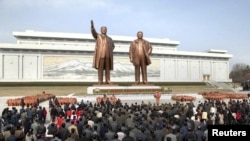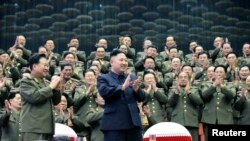SEOUL —
North Korea on Monday marked the birth of its founder amid regional worries it would use the occasion to provocatively test fire one or more medium-range missiles.
On what it calls the Day of the Sun, North Korea honored the 101st birth anniversary of its founder and eternal president Kim Il Sung, who died in 1994.
There was, however, no military parade nor any large-scale festivities.
More significantly, the isolated country which stresses a “military-first” policy did not launch ballistic missiles or even short range rockets, as had been widely anticipated.
South of the demilitarized zone, conservative groups were persuaded by the government to postpone launching balloons towards the North Monday containing propaganda leaflets and U.S. dollar bills.
South Korea's ministry of national defense stresses it remains on alert for missile launches the North could conduct “at any time.”
Defense minister Kim Kwan-jin told a parliamentary committee there are no signs, however, the North is preparing to initiate an all-out war.
That assessment was backed by tour guide Hannah Barraclough of Koryo Tours who posted her observations (Sunday night) on YouTube from Pyongyang.
“There's no tanks. There's not really any sign,” she said. “In fact, there's less sign of readying for some kind of war than there was that I saw in March.”
South Korean foreign minister Yun Byung-se, speaking at the World Journalists' Conference in Seoul, says the government is looking to mix strong pressure with strong persuasion to defuse tension on the peninsula.
"Strong pressure comes from for example U.N. Security Council. It could come from countries in this part of the world. But also, the persuasion can come from China, U.S. and South Korea," said Yun. "This is one reason why my government under President Park wants to launch the trust-building process. In the trust-building process, it's called meaning some kind of dialogue and contacts and exchange of people."
South Korea's government Monday expressed “deep regret” the North has bluntly rejected the most recent proposal for dialog.
North Korea on Sunday dismissed as a “cunning trick” last week's suggestion from Seoul that discussions should be pursued to solve inter-Korean differences, such as Pyongyang pulling its workers last week from the Kaesong industrial complex. That was the only remaining North-South joint venture.
In a wide-ranging policy speech before university students in Tokyo, U.S. Secretary of State John Kerry remarked that Washington “remains open to authentic and credible negotiations on denuclearization” but the burden is on Pyongyang to move in the right direction.
“North Korea must take meaningful steps to show that it will honor commitments it has already made. And it has to observe laws and the norms of international behavior,” he said.
Kerry's remark came as he wrapped up four days of meetings with leaders in Seoul, Beijing and Tokyo. Much of the discussion centered on a recent string of disturbing pronouncements from Pyongyang.
North Korea, following the launching of a satellite into space on a multi-stage missile and a third nuclear test, has unleashed a stream of rhetoric that is extreme even by its typical bellicose standards.
Pyongyang declared it was abrogating the 1953 armistice, preparing for a preemptive nuclear attack on the United States and proclaimed a state of war in existence with the South.
Many analysts interpret the rhetoric as an indication the isolated and impoverished country intends to maintain development of weapons of mass destruction no matter the political or economic cost.
North Korea is under numerous international sanctions for its nuclear weapons and missile development programs.
The United States, which is conducting joint military exercises with South Korea through the end of the month, in recent weeks has sought to demonstrate its commitment to its ally by flying air force strategic bombers over the South and moving some anti-missile naval ships to waters off the peninsula.
On what it calls the Day of the Sun, North Korea honored the 101st birth anniversary of its founder and eternal president Kim Il Sung, who died in 1994.
There was, however, no military parade nor any large-scale festivities.
More significantly, the isolated country which stresses a “military-first” policy did not launch ballistic missiles or even short range rockets, as had been widely anticipated.
South of the demilitarized zone, conservative groups were persuaded by the government to postpone launching balloons towards the North Monday containing propaganda leaflets and U.S. dollar bills.
South Korea's ministry of national defense stresses it remains on alert for missile launches the North could conduct “at any time.”
Defense minister Kim Kwan-jin told a parliamentary committee there are no signs, however, the North is preparing to initiate an all-out war.
That assessment was backed by tour guide Hannah Barraclough of Koryo Tours who posted her observations (Sunday night) on YouTube from Pyongyang.
“There's no tanks. There's not really any sign,” she said. “In fact, there's less sign of readying for some kind of war than there was that I saw in March.”
South Korean foreign minister Yun Byung-se, speaking at the World Journalists' Conference in Seoul, says the government is looking to mix strong pressure with strong persuasion to defuse tension on the peninsula.
"Strong pressure comes from for example U.N. Security Council. It could come from countries in this part of the world. But also, the persuasion can come from China, U.S. and South Korea," said Yun. "This is one reason why my government under President Park wants to launch the trust-building process. In the trust-building process, it's called meaning some kind of dialogue and contacts and exchange of people."
South Korea's government Monday expressed “deep regret” the North has bluntly rejected the most recent proposal for dialog.
North Korea on Sunday dismissed as a “cunning trick” last week's suggestion from Seoul that discussions should be pursued to solve inter-Korean differences, such as Pyongyang pulling its workers last week from the Kaesong industrial complex. That was the only remaining North-South joint venture.
In a wide-ranging policy speech before university students in Tokyo, U.S. Secretary of State John Kerry remarked that Washington “remains open to authentic and credible negotiations on denuclearization” but the burden is on Pyongyang to move in the right direction.
“North Korea must take meaningful steps to show that it will honor commitments it has already made. And it has to observe laws and the norms of international behavior,” he said.
Kerry's remark came as he wrapped up four days of meetings with leaders in Seoul, Beijing and Tokyo. Much of the discussion centered on a recent string of disturbing pronouncements from Pyongyang.
North Korea, following the launching of a satellite into space on a multi-stage missile and a third nuclear test, has unleashed a stream of rhetoric that is extreme even by its typical bellicose standards.
Pyongyang declared it was abrogating the 1953 armistice, preparing for a preemptive nuclear attack on the United States and proclaimed a state of war in existence with the South.
Many analysts interpret the rhetoric as an indication the isolated and impoverished country intends to maintain development of weapons of mass destruction no matter the political or economic cost.
North Korea is under numerous international sanctions for its nuclear weapons and missile development programs.
The United States, which is conducting joint military exercises with South Korea through the end of the month, in recent weeks has sought to demonstrate its commitment to its ally by flying air force strategic bombers over the South and moving some anti-missile naval ships to waters off the peninsula.












